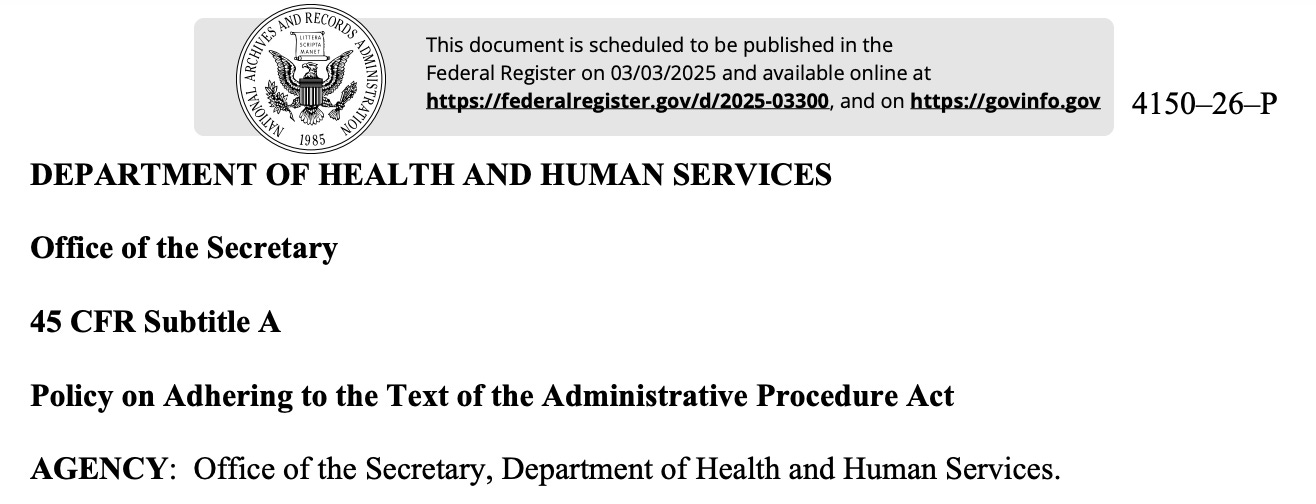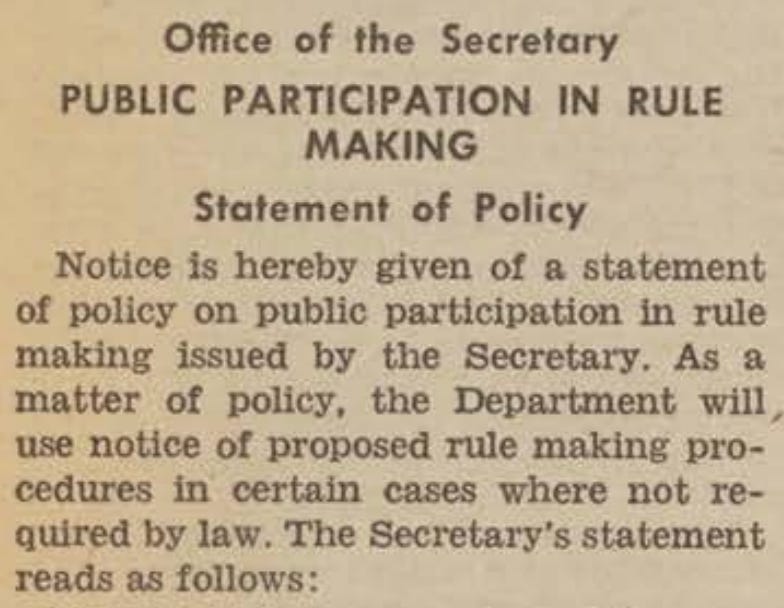RFK Jr.'s "radical transparency" means ending a 54-year-old transparency policy
The Nixon-era policy gave the public the ability to comment on HHS decisions relating to “public property, loans, grants, benefits, or contracts.“ RFK Jr. ended that on Friday.
Robert F. Kennedy Jr., the Department of Health and Human Services secretary who promised “radical transparency” shortly after his Senate confirmation, 10 days later announced that he was ending a 54-year-old department transparency commitment.
On Friday morning, Kennedy filed a bureaucratic notice headlined as, “Policy on Adhering to the Text of the Administrative Procedure Act.“ The notice was first reported by Isabella Cueto at Stat News. As the notice summarizes the action:
What is this?
The Administrative Procedure Act — which sets forth the procedures for agency rulemaking, including notice and comment — exempts regulations relating to “public property, loans, grants, benefits, or contracts“ from notice and comment.
But, as Kennedy’s notice explained, “In a 1971 Federal Register document, the Department adopted a policy that waived the APA’s statutory exemption from procedural rulemaking requirements for rules and regulations relating to public property, loans, grants, benefits, or contracts (Richardson Waiver). 36 FR 2532 (Feb. 5, 1971).”
Accordingly, “The Richardson Waiver thus required the Department to use the APA’s notice and comment rulemaking procedures for these types of matters.“
Until Friday.
Under Kennedy’s “radical transparency” regime, he stated, “Effective immediately, the Richardson Waiver is rescinded and is no longer the policy of the Department.”
The Nixon-era document referred to as the “Richardson Waiver” was still available, as of Friday at least, on the Federal Register’s archives website.1
On February 4, 1971, Robert H. Brady, the assistant secretary for administration in what was then the Department of Health, Education, and Welfare, filed a “Public Participation in Rule Making“ notice detailing a January 28, 1971 statement of policy from the department’s secretary — RFK Jr.’s predecessor.
Here it is, the statement that became known as the Richardson Waiver:
On Friday, RFK Jr. rescinded that policy, ending 54 years of transparency, notice, and comment on rules and regulations relating to “public property, loans, grants, benefits, or contracts“ at HHS.
The secretary at the time, the person after whom the waiver is named, was Elliot Richardson.
Richardson’s legacy, however, would be established not primarily for his time leading the health agency now run by RFK Jr., but as the attorney general who resigned from the Nixon administration two-and-a-half years later rather than fire the Archibald Cox, the special prosecutor investigating Watergate.
The resignations and subsequent firings became known as the Saturday Night Massacre, and preceded Richard Nixon’s own resignation from the presidency by a little less than a year.
Richardson, however, continued a public life — serving in presidentially appointed roles in both Republican and Democratic administrations long after Nixon’s resignation. In 1998, he received the Presidential Medal of Freedom from then-president Bill Clinton for his life of service.
In awarding him the highest civilian honor, Clinton said, “No public servant has shown greater respect for the Constitution he has served.”
In a related reminder of the importance of government websites for historical transparency, the National Archives and Records Administration runs the Federal Register. NARA has been targeted by the Trump administration, so its continued stability — like most of the federal government — is questionable. But, for now, we have this important and readily available access.







![Our implementation of the Conference's recommendation should result in greater participation by the public in the formulation of this Department's rules and regulations. The public benefit from such participation should outweigh any administrative inconvenience or delay which may result from use of the APA procedures in the five exempt categories. Effective immediately, all agencies and offices of the Department which issue rules and regulations relating to public property, loans, grants, benefits, or contracts are directed to utilize the public participation procedures of the APA, 5 U.S.C. 553. Although the APA permits exceptions from these procedures when an agency for good cause finds that such procedures would be impracticable, unnecessary or contrary to the public inter-est, such exceptions should be used sparingly, as for example in emergences and in instances where public participation would be useless or wasteful because proposed amendments to regulations cover minor technical matters. Dated: January 28, 1971. RODNEY H. BRADY, Assistant Secretary for Administration. [PR Doo.71-1604 Filed 2-4-71;8:48 am] Our implementation of the Conference's recommendation should result in greater participation by the public in the formulation of this Department's rules and regulations. The public benefit from such participation should outweigh any administrative inconvenience or delay which may result from use of the APA procedures in the five exempt categories. Effective immediately, all agencies and offices of the Department which issue rules and regulations relating to public property, loans, grants, benefits, or contracts are directed to utilize the public participation procedures of the APA, 5 U.S.C. 553. Although the APA permits exceptions from these procedures when an agency for good cause finds that such procedures would be impracticable, unnecessary or contrary to the public inter-est, such exceptions should be used sparingly, as for example in emergences and in instances where public participation would be useless or wasteful because proposed amendments to regulations cover minor technical matters. Dated: January 28, 1971. RODNEY H. BRADY, Assistant Secretary for Administration. [PR Doo.71-1604 Filed 2-4-71;8:48 am]](https://substackcdn.com/image/fetch/$s_!HEBE!,w_1456,c_limit,f_auto,q_auto:good,fl_progressive:steep/https%3A%2F%2Fsubstack-post-media.s3.amazonaws.com%2Fpublic%2Fimages%2Fbe78ceaf-08f5-4b23-876f-3aa2d20a20e0_796x1104.png)

Radical Transparency: "We will tell you what we want you to hear, and you will take it"
I suspect that they'll try severely modify or discard rules without public notice, so they can't be challenged. This is going to be incredibly dangerous.